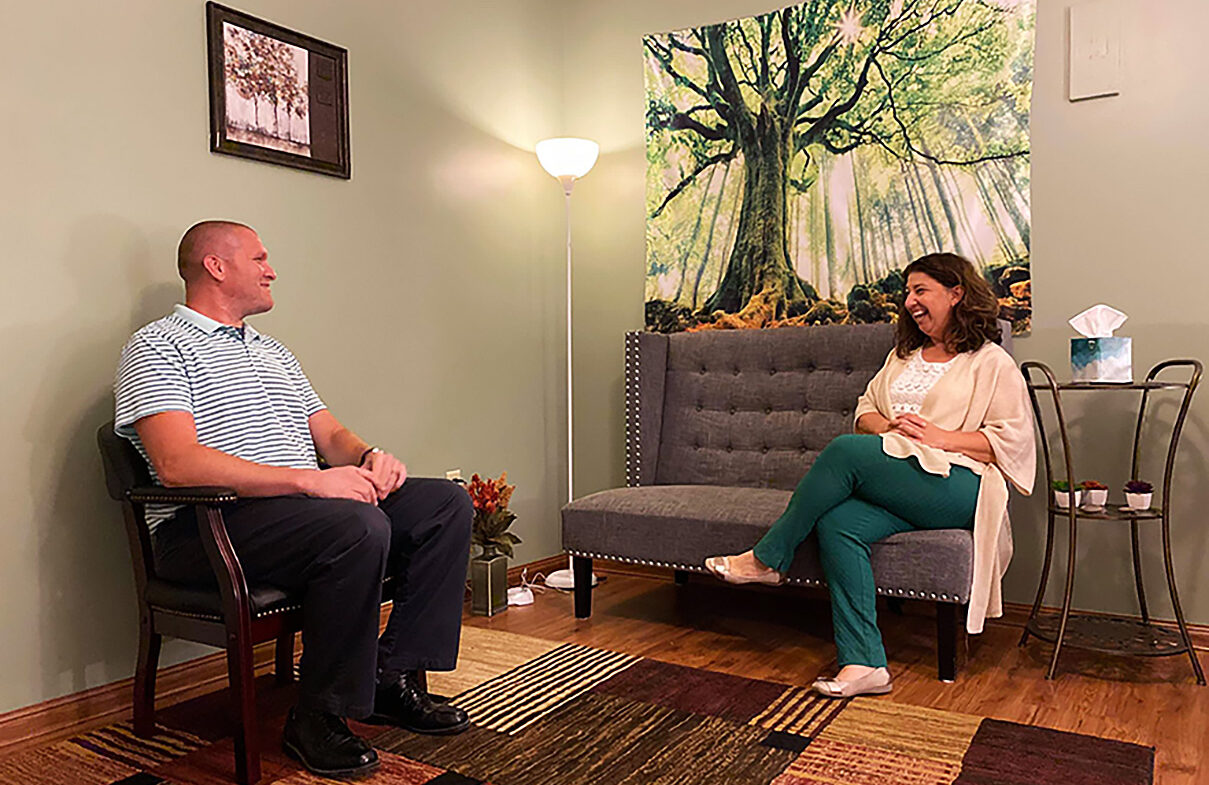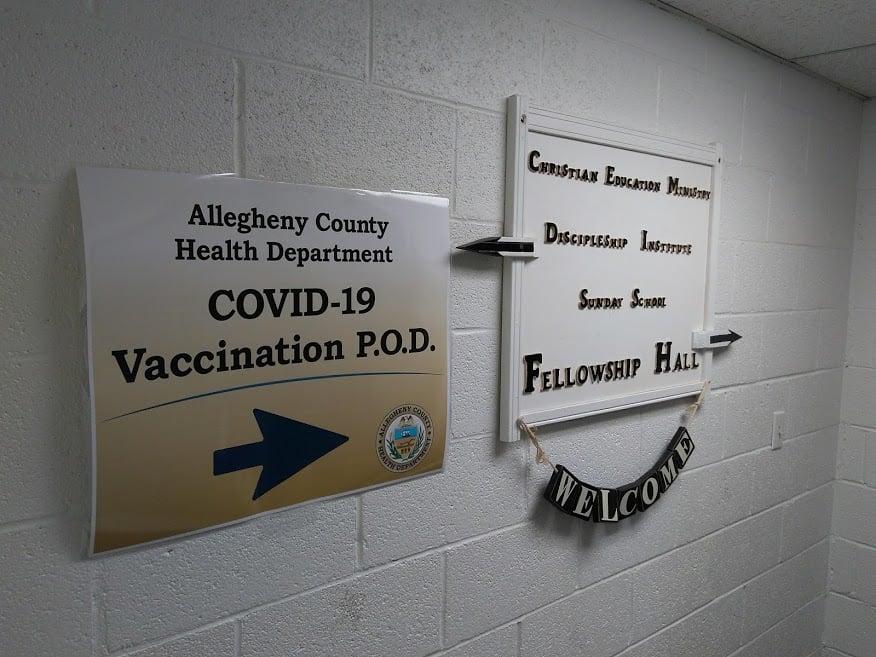“All of us can relate to it in some way,” said Mike Philhower of the increased stress parents are feeling in the wake of COVID-19.
(Photo by Stacey Gross. Mike Philhower, owner of Sunrise Collaborative, and Karen Ashbaugh, provider, discuss the challenges COVID-19 has caused since spring.)
From quarantines to a five-month-and-counting snow day, Philhower said, local mental health providers are seeing a significant increase in the number of potential clients referred from sources like primary care physicians.
At Sunrise Collaborative, the practice co-owners Philhower and his wife Amy developed in 2016, employing an additional five practitioners under the Sunrise umbrella, referrals have been spiking since around June and into July. And anxiety, said Philhower, is at the heart of it.
The pandemic, whose effects began to be felt for Warren residents around the end of February through the middle of March this year, has thrown everyone’s lives into a context of ultimate uncertainty. Providers and clients alike, said Philhower, are navigating a new set of circumstances – a new normal as it unfolds – in terms of how their families function. Now, he said, parents aren’t just dealing with the seemingly endless summer break but also decisions about how and when to send their kids back to an education that’s been interrupted with unprecedented force since spring.
“Do we send them back to school or not,” Philhower asked, adding that he and Amy have asked themselves the question countless times since June. “Or do they take the remote route toward education this year? You make a decision, and then things change, and you second guess yourself. Everything is just so uncertain.”
The parents and families that Sunrise practitioners see, he said, come in with an array of personal issues on which they want to make progress. Often, anxiety is at the top of the list. Now, said Philhower, with no concrete idea of what school will even look like when their kids finally can go back, parents are dealing with an added layer of concern, and that extra layer is often one layer too many.
So how’s a parent to cope?
Philhower said his practice recently developed a small training in self-care during the COVID crisis, and the main message within it is to relax, go easy on yourself, and develop new routines that reflect those updated circumstances your family is dealing with.
“I talk to myself a lot every day,” Philhower said of his own coping strategy of choice. “The goal of therapy is, ultimately, to change the internal dialogues we carry around with us,” and so doing is something everyone can accomplish on a daily basis.
“In this exact moment, with this exact knowledge that I have, I am doing the best I can,” Philhower said he tells himself frequently. Especially, he said, at night. When the day has ended and we haven’t responded to our children in the ways we would have liked to, Philhower says it’s important to go easy on yourself and remember that we’re all just doing the best we can in a completely unpredictable situation.
“There is no reference point for this,” said Philhower. “You are doing the best you can, and it’s unhelpful to go over our day with a critical eye when the time comes to sleep it off.”
Its importantalso, said Philhower, for parents struggling with interactions throughout the day to allow themselves their frustration and overwhelm when the day is done. Beating yourself up for feeling frustrated, said Philhower, will do nothing but exacerbate the frustration and lessen the chances of getting back on track.
“You’re allowed to feel this way,” Philhower said. “And you are not alone in that. A lot of people are feeling this way.”
One good thing that may come from the pandemic, and all of the fallout associated with it, is that parental burnout and overwhelm is now becoming more normalized, as more and more parents experience it firsthand. That, said Philhower, makes the task of dealing with it significantly easier for those currently struggling.
But what about in the moments when things are getting out of control? When parents used to working in an office find themselves trying to bribe their children to let them get through a thirty-minute Zoom meeting at the dining room table without resorting to fisticuffs and bids for attention?
Grounding, said Philhower, is an easy way to arrest a careening train of thought. When a parent feels their frustration building, he said, it’s important to recognize it, stop the thought, take a breath, and ground yourself in some way back to the present. Sensation, he said, is often the quickest and easiest way to do so.
“Go to the freezer, get an ice cube, and just hold it in your hand,” said Philhower. “Focus on that sensation until you feel your system coming back to the present.”
From there, he said, it can be helpful to take advantage of less stressful moments as opportunities to develop a plan to keep things from getting stressful again.
“You’ve got to disrupt that dysregulation in your brain in order to get back to a sense of control,” Philhower said.
Only then can we get back to whatever routine we’ve established. As for what to do with kids in the age of social distnancing and face masks, Sunrise therapists have “encouraged the parents we see to go on virtual visits online with their kids,” said Philhower.
He added that lots of museums, amusement parks, and other kid-friendly attractions are offering online experiences to make up for the fact that a physical visit is temporarily unavailable.
Routine, Philhower added, is especially important now, when already established routines have been flung out the window. Children, especially, need routine in order to feel grounded and emotionally well. Just because we can stay in our pajamas all day now, said Philhower, doesn’t mean we should.
“It’s important to look at your family now, and to establish new routines for our days so that your kids know what’s coming next, and what’s going to happen,” he said.
Kids lacking a predictable and consistent routine in their days are often the kids whose parents start to see behaviors and patterns associated with anxiety and stress.
“Our kids aren’t immune to that either,” said Philhower. “And with a limited number of coping mechanisms compared to adults, kids often start acting out when routine falls apart.”
Beyond that, said Philhower, simply knowing one’s resources and reaching out to them in times of stress is so important. “Now, with social distancing and things, you maybe can’t have family or friends watch your kids while you get a break,” but knowing who you can call and text to externalize negative feelings and frustrations is important. “And if we don’t have someone we can reach out to, maybe now is the time for us to start looking for and developing one.”
Doing so, Philhower said, is one of many potential good things that may arise in the aftermath of a pandemic. His hope is that people will become more aware of the stressors that parents deal with every day, as well as what they can do to nip spiraling frustration in the bud, before it turns into full-blown burnout.
Locally, Philhower said, there are a number of providers but most – especially now – will be taking new patients at a three month wait or more. And, while it’s important to seek out and secure an appointment with a mental health provider for those who feel they need to, there are national resources like the NAMI hotline to fill the void in the meantime, said Philhower. The best thing, though, is to have a mom or a dad friend you can simply text to say, “I don’t like being a parent today.” The simple act of externalizing negative emotions can often mitigate the potential for them to turn into negative behaviors directed at our kids, said Philhower.
Find out more about Sunrise Collaborative by visiting sunrisecollaborative.com.


































